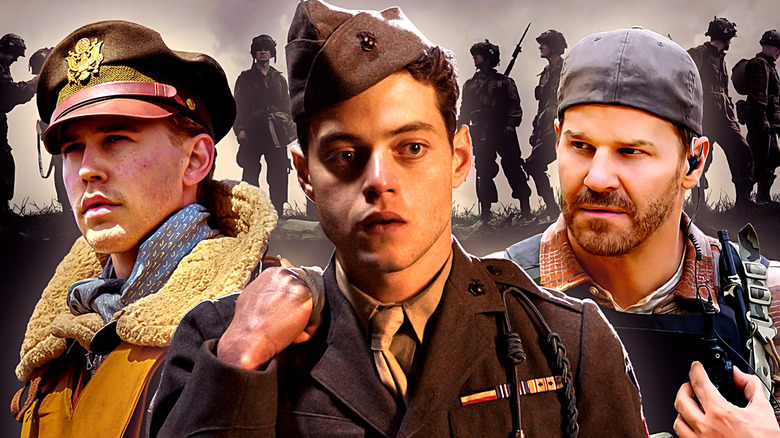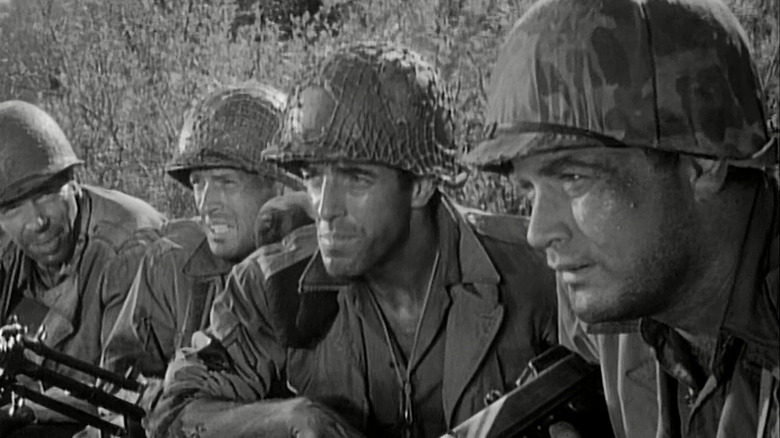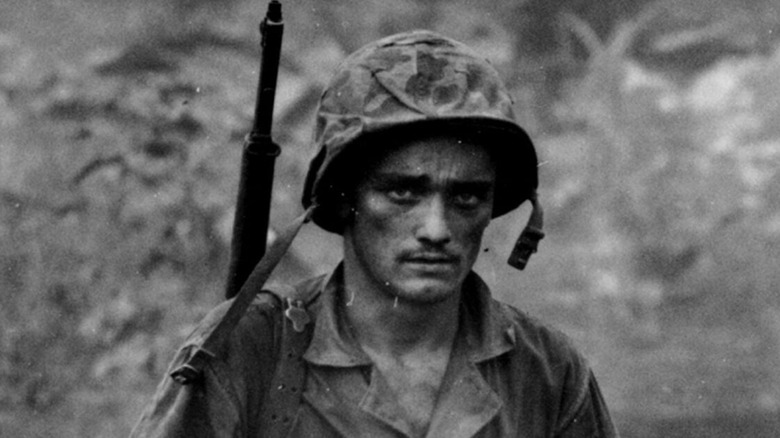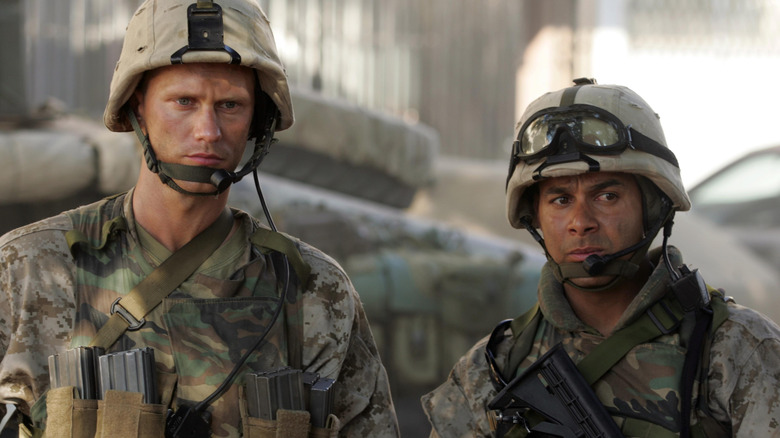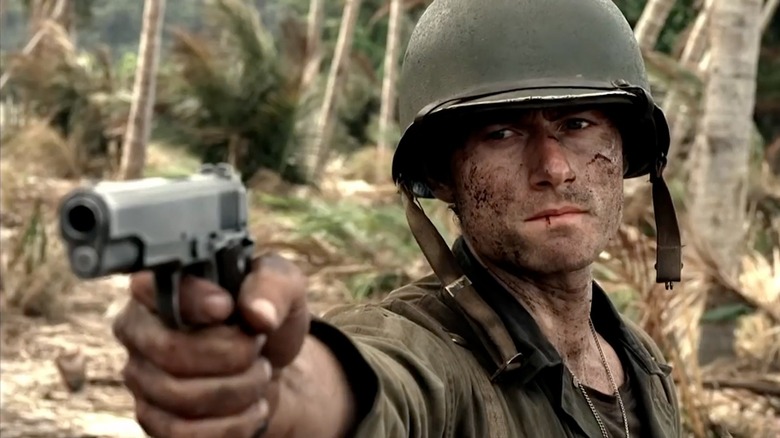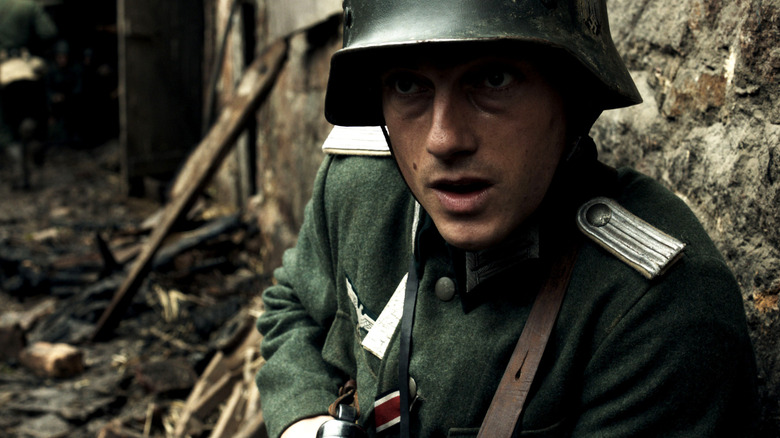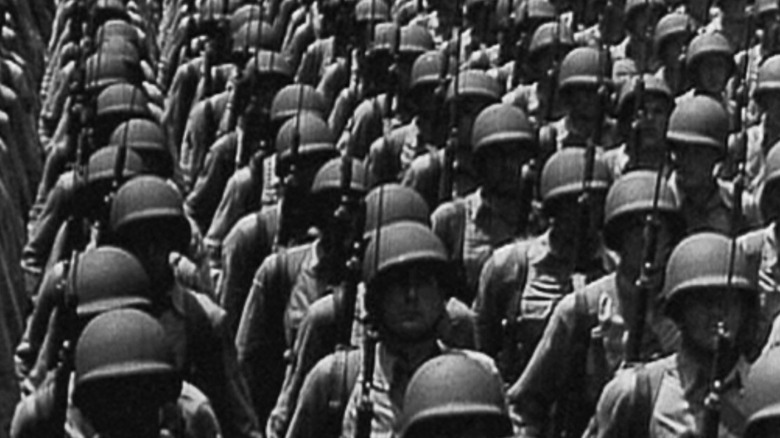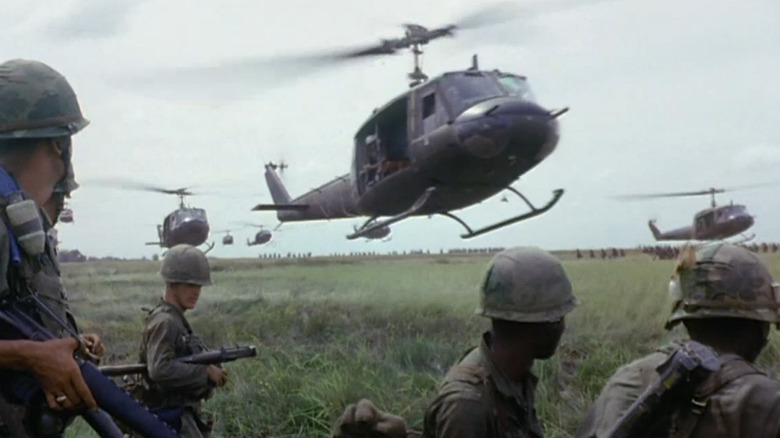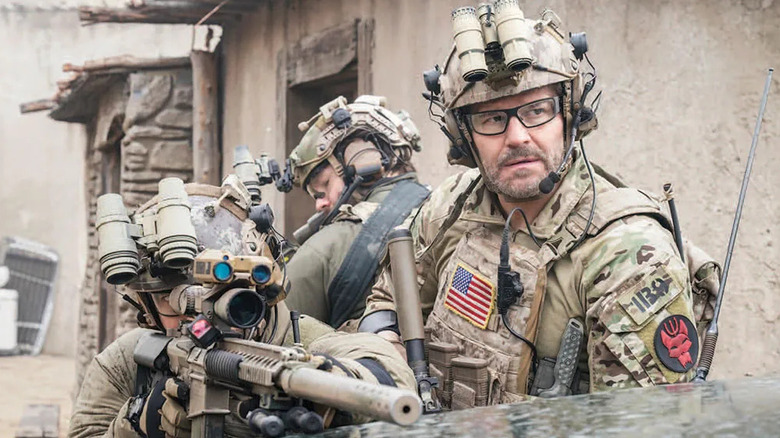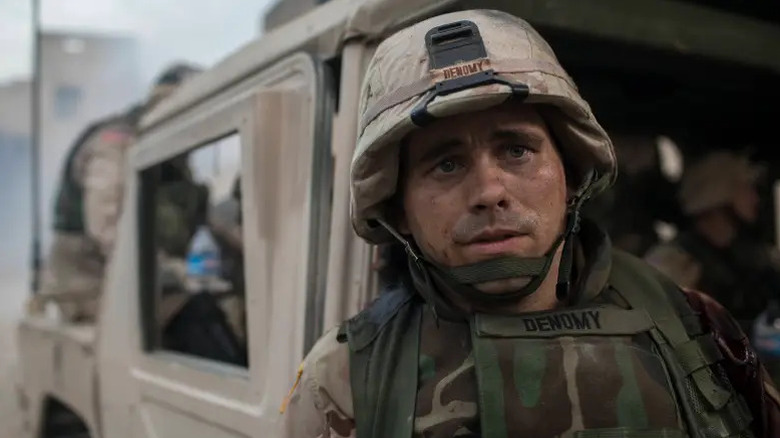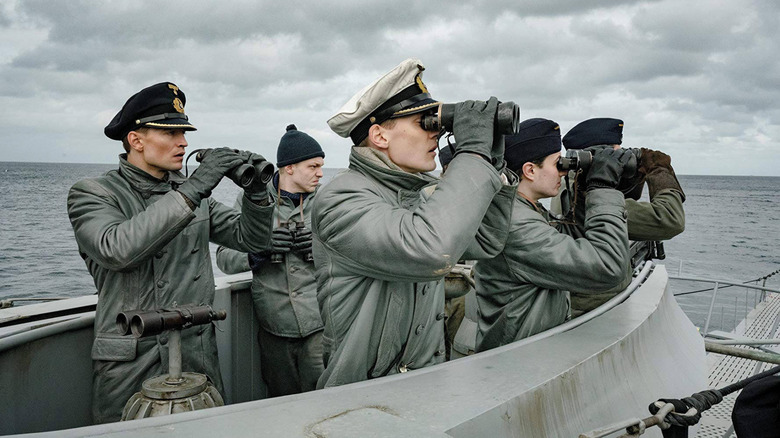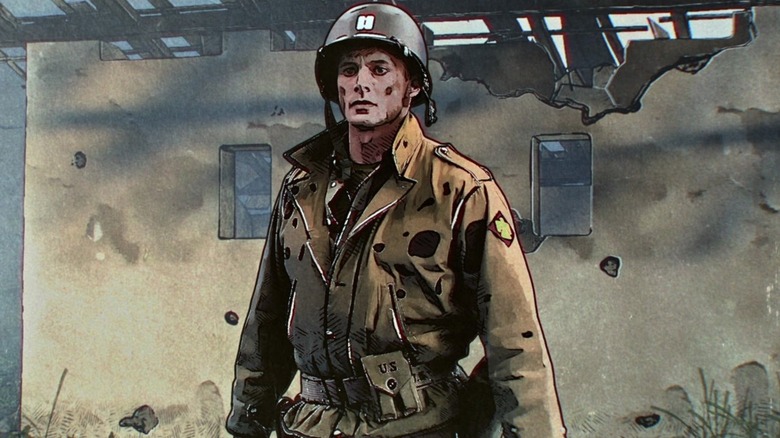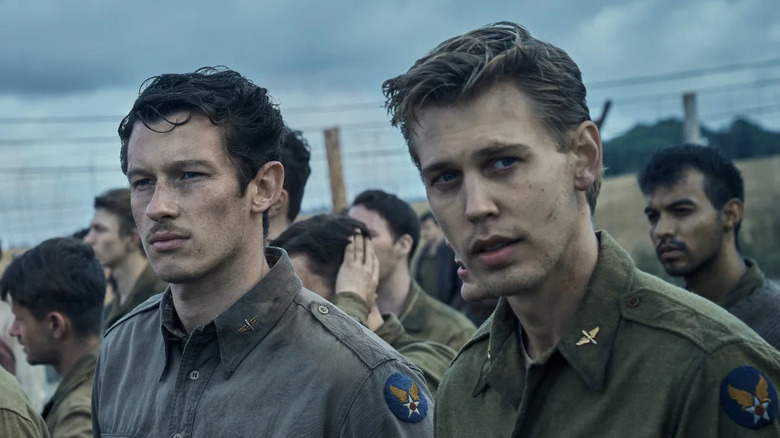12 Best TV Shows Like HBO's Band Of Brothers
The HBO limited series "Band of Brothers" was the most expensive television miniseries at the time, recreating the American military unit Easy Company's European activities during World War II. Executive produced by Steven Spielberg and Tom Hanks, the series provided an expansive and factually grounded account of American combat involvement in Western Europe during the war. Like Spielberg and Hanks' previous collaboration, the award-winning "Saving Private Ryan," "Band of Brothers" was praised for its stellar cast, realistic action, and expert attention towards historical authenticity. The series still sets the bar of quality for military shows, of any conflict, though there are a number of similar shows fans should check out next.
Whether it's other HBO television productions examining various harrowing wars or long-running shows where wartime skirmishes punctuate every episode, there are countless military shows available. The best in the genre strive towards the same level of quality and respect to its subject matter that "Band of Brothers" captured so well in 2001.
With that in mind, here are the 12 best TV shows like HBO's "Band of Brothers."
Combat!
While there were plenty of war shows on television in the 1960s, including "12 O'Clock High" and "Hogan's Heroes," none had the same intensity as "Combat!" at the time. Running for over 150 episodes across five seasons from 1962 to 1967, "Combat!" followed a platoon of American soldiers fighting the German army across France in World War II. The platoon was commanded by Lieutenant Gil Hanley (Rick Jason), with squad-based action led by Sergeant Chip Saunders (Vic Morrow). Given the ferocious fighting that the characters endured, supporting characters rotated in and out regularly as they were killed in various skirmishes throughout the series.
The moody nature of "Combat!" worked best in the series' first four seasons, which were produced and broadcast in black-and-white. This atmosphere was mitigated in its final season, the only one produced in color, though Jason and Morrow continued to deliver consistently striking performances. "Combat!" consciously avoided more jingoistic depictions of WWII in television and film at the time, with its characters presented in more grounded and world-weary light. Though one could argue "Combat!" was ahead of its time, it was still a clear contemporary success and continues to stand as the longest-running WWII drama series ever made.
The War
Documentary filmmaker Ken Burns has been showcasing different elements of American history and culture since 1981 with well-researched and engrossingly produced limited series. Teaming up with frequent collaborator Lynn Novick, Burns turned his focus to the United States' involvement in World War II with the 2007 documentary "The War." Running for 14 hours across seven episodes, the miniseries primarily focuses on how the war effort affected four communities of different sizes and parts of the country. This documentary traces the lead-up to America formally joining the war in 1941 through combatants from the selected communities returning home after the conflict's conclusion in 1945.
Like most Burns' documentaries, "The War" features a mix of interviews with people who experienced its subject matter first-hand, celebrities reading historical documents from the era, and an underlying narration. Each episode covers a period spanning anywhere from three to 12 months, alternating between the different theaters of operations and the American homefront. As ever, Burns and Novick not only present an exhaustively informative account of their subject, but one where every episode feels like it tells its own complete story. Easily among Burns' best work, "The War" is the ultimate American documentary project covering WWII.
Generation Kill
After working together on "The Wire," writers and producers David Simon and Ed Burns teamed up with war correspondent Evan Wright for the HBO limited series "Generation Kill." The show adapted Wright's 2004 memoir of the same name, recounting his experiences as an embedded journalist among U.S. Marines during the American invasion of Iraq in 2003. Wright (Lee Tergesen) is assigned to a lead vehicle headed by Staff Sergeant Brad Colbert (Alexander Skarsgård) as they progress into Iraq towards Baghdad. This unit finds itself tasked with multiple deadly missions during Wright's time with them as the intrepid journalist observes the Marines in action.
Unlike a lot of war stories in television and film, "Generation Kill" keeps its perspective incredibly grounded, primarily from Wright's point-of-view with a single unit. Though Colbert and his men play a pivotal role in the invasion, this isn't an omniscient story about the overall conflict. Instead, it's a tightly focused look at men at war, dutifully carrying out dangerous assignments and bonding with each other as they forge a brotherhood in arms. Highly detailed and meticulously executed, "Generation Kill" places audiences in the thick of combat as they experience a day in the life of a Marine.
The Pacific
With "Band of Brothers" focusing entirely on Americans fighting in the European Theater of World War II, its spiritual successor, "The Pacific," focused on the Pacific Theater. Based on nonfiction accounts by Eugene Sledge and Robert Leckie, the 2010 HBO limited series primarily focuses on three Marines in separate units during the war. This triple-perspective narrative approach alternates between its main characters, Sledge (Joseph Mazzello), Leckie (James Badge Dale), and John Basilone (Jon Seda) and the harrowing battles they endured. "The Pacific" goes beyond the war, showing how the surviving veterans reintegrated into civilian life.
"The Pacific" reunited "Band of Brothers" executive producers Steven Spielberg, Tom Hanks, and Gary Goetzman for another ambitious WWII miniseries. Though set in the same war, "The Pacific" is a different beast than "Band of Brothers," mirroring the variances between the respective theaters of operations. The fighting in the 2010 series is particularly vicious, while the same drive towards authenticity and recognition of real veterans involved is maintained. The perfect companion to "Band of Brothers," "The Pacific" highlights an often overshadowed component of the conflict to great effect.
Generation War
Just as "All Quiet on the Western Front" provided a German perspective on World War I, the 2013 limited series "Generation War" offers a German perspective on World War II. The three-episode story is told from the perspective of five friends living in Berlin at the outset of the war. Two brothers in the group fight on the Eastern Front, the women are forced to comply with the Nazis, and the group's Jewish friend is sent to a concentration camp. To survive, each of the group makes their own moral compromises, though not all of the friends live to see the end of the war.
Enormously popular upon its premiere in Germany, "Generation War" was not without its share of controversy, particularly with its depiction of Polish partisan fighters. What the miniseries does well is underscore that ordinary German citizens were also victims of the Nazi Party, enduring the widespread persecution and conflict their government inflicted on them. In that sense, the story is very much a tragedy, with no sense of triumph or relief, even from the surviving friends in the closing scene. A sobering exploration of defeat on a national and personal scale, "Generation War" is a frank depiction of the German WWII experience.
Five Came Back
When the United States formally entered World War II, the whole country was galvanized into action, including Hollywood. The Netflix original limited series "Five Came Back" follows five filmmakers who were directly included in various aspects of the war effort during the conflict. Whether it was producing propaganda films on behalf of the federal government at home or filming footage on the frontlines, some of the biggest directors in the industry were involved. The filmmakers have to contend with rigid government censorship while the directors in combat zones are influenced by the traumatic imagery they witnessed for the rest of their lives.
The impact of media shaping public perception of reality, both negatively and positively, is thoroughly explored throughout the series' three episodes. This culminates in the directors' presence during D-Day and the shocking liberation of Holocaust concentration camps. Perhaps the most fascinating aspect of the documentary is seeing how the directors' wartime experiences then visibly shaped their subsequent movies. Putting some of the most influential filmmakers and their work in a new light, "Five Came Back" is a revealingly informative watch.
The Vietnam War
While Ken Burns did an excellent job examining World War II in "The War," he took his renowned documentary filmmaking skills to the next level with 2017's "The Vietnam War." Reuniting with co-director Lynn Novick and screenwriter Geoffrey C. Ward, Burns provided an unflinching deep dive into the United States' involvement in Vietnam. Starting with the French colonization of Indochina in the 19th century, the documentary includes interviews with 79 historical participants and copious archival material. For this documentary, Burns primarily focuses on direct combatants rather than more political and public figures, not just from America, but also North and South Vietnam.
"The Vietnam War" is one of Burns' most ambitious documentaries to date, with production reportedly lasting over a full decade. The series is also the creative team's most graphic and mature, providing a searing look at the conflict from multiple perspectives and the traumatic toll it exacted on the world. Academy Award winners Trent Reznor and Atticus Ross (snubbed for their work on "Challengers") score the documentary, their only collaboration with Burns, helping set the series apart from Burns' other work. A bitterly honest look at the conflict, "The Vietnam War" is the most hauntingly visceral project Burns has ever produced.
SEAL Team
Though David Boreanaz had memorably played U.S. Army Ranger Seeley Booth in "Bones," he switched military branches for his lead role in the CBS series "SEAL Team." Boreanaz plays Master Chief Jason Hayes, the leader of Navy SEAL Bravo Team, who is still reeling from the loss of a comrade and friend in battle. As Hayes recovers and rallies his unit, he must balance his responsibilities with the strain it puts on his domestic life. With the unit serving as the tip of the spear, Bravo Team coordinates with their CIA liaison Mandy Ellis (Jessica Paré) to get the job done.
Many episodes of "SEAL Team" take place in a different global hotspot. as Hayes and his unit complete another deadly mission all in the line of duty. This often is juxtaposed with developments in the personal lives of Hayes and his men, often having to do with their families. Though the action is well-handled, especially a network television series, the show's real appeal is seeing how Bravo Team grows and faces crises together. A solid military action series that balances its special forces combat with familial drama, "SEAL Team" largely maintained its impressive quality across its seven-season run.
The Long Road Home
If "Generation Kill" focuses on the opening days of the Iraq War, the 2017 limited series "The Long Road Home" takes place right in the thick of it. Based on the nonfiction book of the same name by Martha Raddatz, the National Geographic series follows a U.S. Army unit during the 2004 siege of Sadr City. What starts out as a routine assignment quickly turns into an prolonged battle as the unit is caught in a well-coordinated ambush. This is juxtaposed with the unit's family back in Texas closely following the news for what is happening to their loved ones' in Baghdad.
While the basic premise to "The Long Road Home" seems well-worn on the surface, it's the strong cast and factual basis of the story that elevates the material. Michael Kelly leads a well-rounded ensemble cast, with Kelly playing Lieutenant Colonel Gary Volesky, an officer determined to keep a disastrous situation from turning far worse. Where the show excels is when it showcases its characters' backstories, not only humanizing them, but instilling a greater sense of emotional investment as they are caught in battle. Competently staged and executed, "The Long Road Home" doesn't reinvent the modern war drama, but also doesn't really try to and is all the better for it.
Das Boot
German author Lothar-Günther Buchheim's 1973 semi-autobiographical novel "Das Boot" was adapted into a landmark war film in 1981. Nearly four decades later, the novel's 1995 sequel "Die Festung" was adapted into a German television series under the admittedly confusing title "Das Boot." The show's scope is more expansive than the movie, not just focused on a single German naval vessel but multiple individuals during World War II. After U-113's sinking, as shown at the end of the movie, the series follows the growing disillusionment of the German military, on land and sea, with the war effort.
Running for four seasons, "Das Boot" utilizes its increased real estate to provide a fuller look at everyday soldiers in the final three years of WWII. As the series progresses, it incorporates perspectives beyond Germany, including the French Resistance and the British Royal Navy. Given how American perspectives usually dominate multimedia depictions of the war, this provides a multifaceted look at Western European front on a broader level. Ambitious and well-rounded, "Das Boot" goes far beyond Buchheim's text to deliver a truly unique account of WWII.
The Liberator
Definitely the most unique entry on this list, the 2017 Netflix original limited series "The Liberator" offered its own visually distinct take on World War II. The production uses a striking cinematography technique, tracing a stylized animation over live-action filmed footage as a hybridized presentation. The story follows real-life U.S. Army officer Felix Sparks (Bradley James) as he fights the Axis Powers across Western Europe at the height of the war. Nicknamed the Thunderbirds, Sparks' unit is composed of a mix indigenous and Mexican American soldiers engaged in some of the most intense fighting in the war.
Across its four-episode run, the animation behind "The Liberator" remains its greatest strength and never loses its visual allure. The Trioscope Enhanced Hybrid Animation is a marvel that breathes new life into this familiar story as it progresses at a steady clip. In that sense, the show is more of an animated experiment in storytelling and one that largely succeeds. For anyone tired of the more conventional black-and-white or grainy aesthetics to WWII stories, "The Liberator" provides a welcome change.
Masters of the Air
After examining the real-life accounts of land-based American soldiers in WWII, Steven Spielberg and his fellow "Band of Brothers" producers turned their focus to aviators in "Masters of the Air." The 2024 Apple TV+ original miniseries is based on the 2007 nonfiction book of the same name by Donald L. Miller. The 100th Bomb Group and the Tuskegee Airmen's operations in the European Theater are the central focus of the series. As friendships form between the airmen in between missions, they face the sobering reality that any time that they go up in the air could be their last.
Even with its change in the type and field of warfare, "Masters of the Air" still has a strong dedication to historical accuracy, as with the creative team's past work. The show boasts some of the most in-demand young actors currently working today, including a standout performance from Austin Butler. Though understandably more visual effects-driven than the preceding limited series from its team, this show still keeps its sense of humanity grounded. "Masters of the Air" boasts a likable ensemble cast while illustrating that aerial battlefields were no less deadly than those on the ground.
